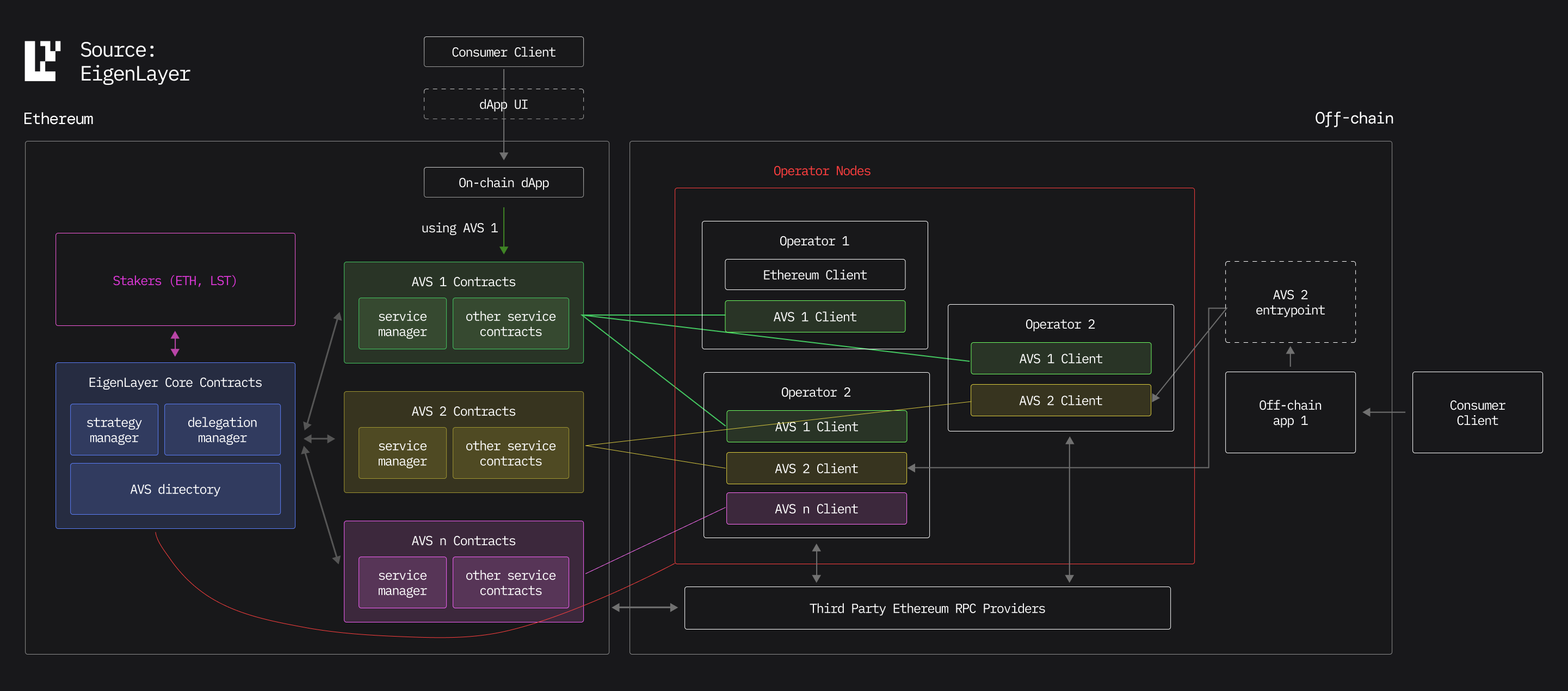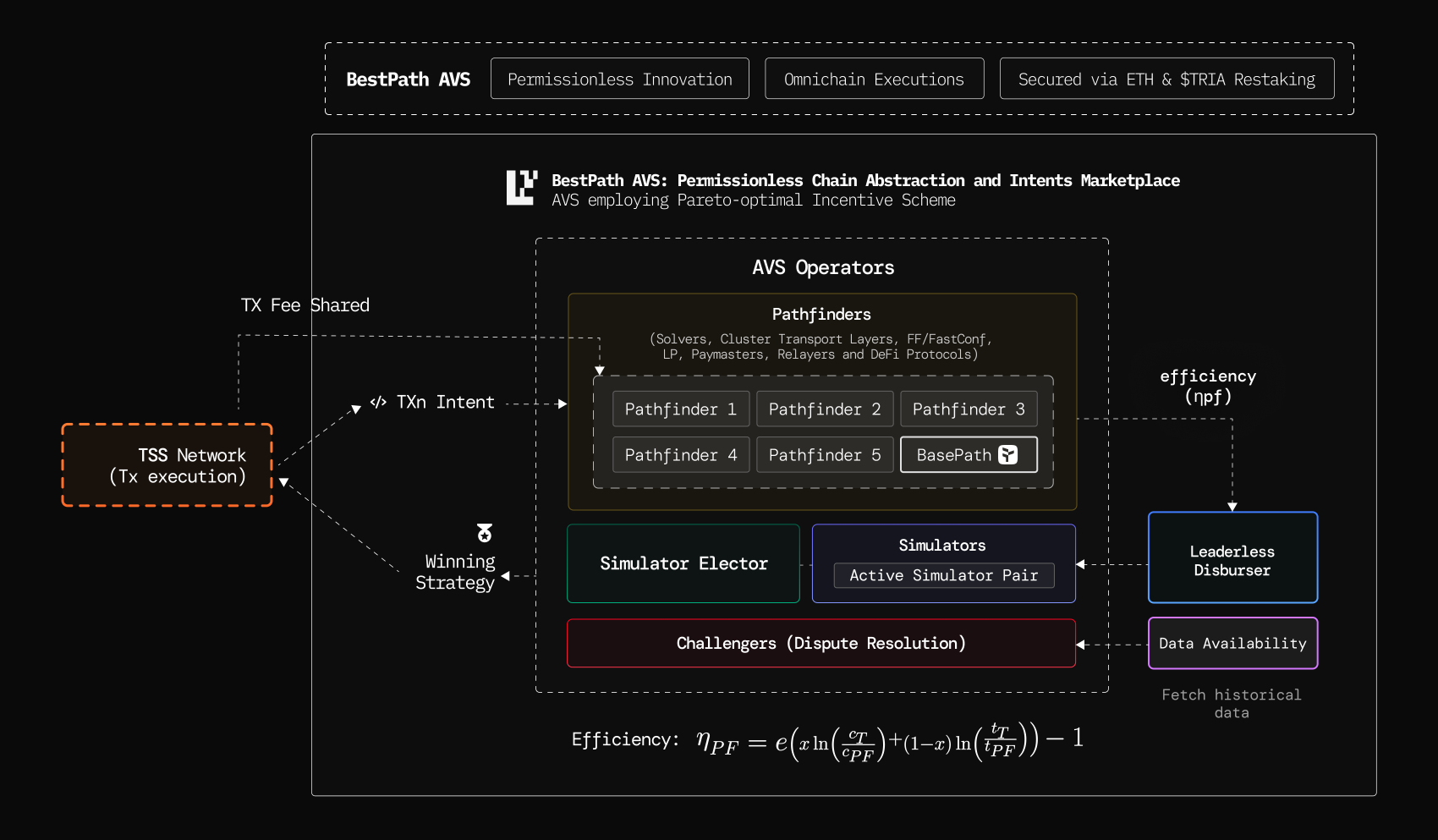BestPath AVS – Permissionless Chain abstraction and Intents marketplace employing Pareto-optimal Incentive Scheme
Certain sections of the documentation are redacted and will be available soon. This version is intended for private circulation only. Technical paper on BestPath available privately.
Prior to diving into BestPath, it's important to establish a foundational understanding of Actively Validated Services (AVS).
EigenLayer’s Actively Validated Service (AVS) is any distributed system requiring its own validation semantics for verification, encompassing sidechains, data availability layers, new virtual machines, keeper networks, oracle networks, bridges, threshold cryptography schemes, and trusted execution environments, among others. Each AVS operates through a distinct set of contracts that manage service-specific state, such as the identities of operators running the service and the amount of stake securing it. EigenLayer's restaking mechanism extends Ethereum’s economic security to a range of independent protocols by allowing Ethereum validators to restake their ETH or liquid staking tokens (LSTs) to support AVS computations. This pooled security model enables AVSs to benefit from Ethereum’s robust validator network, fostering a marketplace where restakers, operators, and AVS providers collaborate. In this ecosystem, operators run specialized node software to execute validation tasks for AVSs, thereby creating a decentralized infrastructure that provides economic security to diverse array of services.

Tria's implementation of the Actively Validated Service (AVS) system secures Unchained's functionalities that demand verifiable and guaranteed computations, commitments on a variety of fast-finality consensus mechanisms backed by the economic security of ETH, and restaked tokens. BestPath AVS is a permissionless chain-abstraction and intents marketplace that pre-computes the most optimal path for a user intent, including but not limited to liquidity unification, gas abstraction, complex and long-tail chain intents across all virtual machine environments (e.g., Ethereum Virtual Machine, Solana Virtual Machine, Cosmos, Move-based chains, and more), and wallet types, including externally owned accounts (EOAs), smart accounts, and universal accounts.
BestPath AVS – Permissionless Chain abstraction and Intents marketplace employing Pareto-optimal Incentive Scheme

BestPath is a permissionless chain-abstraction and intent marketplace Actively Validated Service (AVS) that pre-computes the most optimal path for a user's intent using a variety of on-chain and off-chain primitives. BestPath is a verifiable marketplace AVS formed by PathFinders that run strategies, and simulations on intents across all virtual machine environments (e.g., Ethereum Virtual Machine, Solana Virtual Machine, Cosmos, Move, and Bitcoin), and wallet types, including externally owned accounts (EOAs), smart accounts, and shared wallets. BestPath fosters an inclusive environment, unlocking a Cambrian explosion of innovation and efficiency by encouraging permissionless development.
Pathfinders in the BestPath AVS form dynamic micro-markets of modular interoperability stacks. These micro-markets enable a competitive ecosystem where solvers, DeFi protocols, fast-finality guarantors, transport layers, liquidity pools, relayers, paymasters, and other specialized actors engage in capturing, routing, and executing user intents across heterogeneous environments. BestPath employs a Pareto-optimal incentivization, fostering a synergistic relationship between user experience, developer contribution, and order-flow efficiency. PathFinders are incentivized to create optimal chain-abstraction strategies, with compensation directly linked to the verifiable, efficient execution of the winning BestPath strategy. This system empowers users with an interoperable chain-abstraction framework, operating within a standard-agnostic paradigm to maximize flexibility across diverse virtual machines and wallet configurations.
Consequently, the network experiences potential cost minimization through efficiency-driven dynamics. This Darwinian dynamic incentivizes effective strategies and fuels participation. Through BestPath, users can seamlessly leverage assets from one environment to interface on another, eliminating cross-chain hurdles like bridging, swaps or native gas tokens. BestPath provides the optionality to prioritize variable c over t (refering to cost efficiency over time).
Pathfinders implement strategies that compete with BasePath, which is Tria Protocol's own chain abstraction strategy. Pathfinders share their strategies and their efficiency scores with elected Simulator pairs. The reward system is directly tied to the verifiably efficient execution of a winning Pathfinder's strategy. Operator staking further ensures security for both simulated and non-simulated transactions, as any malicious behavior may lead to slashing and reimbursement to affected parties. Even for transactions that cannot be simulated, security is still guaranteed.